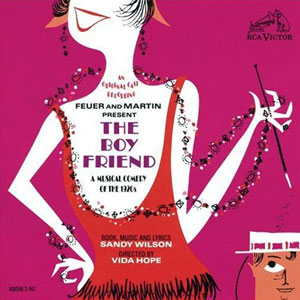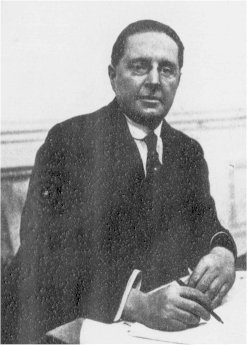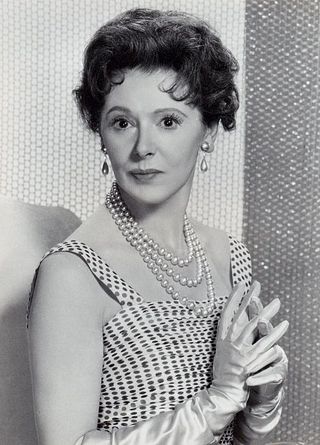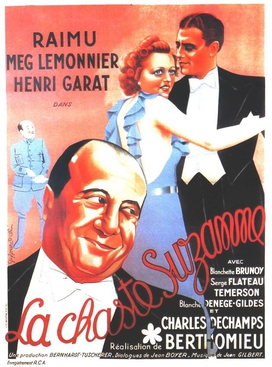
The Boy Friend is a musical by Sandy Wilson. Its original 1954 London production ran for 2,078 performances, briefly making it the third-longest running musical in West End or Broadway history until they were all surpassed by Salad Days. The Boy Friend marked Julie Andrews' American stage debut.

Mary Ellis was an American actress and singer appearing on stage, radio, television and film, best known for her musical theatre roles, particularly in Ivor Novello works. After appearing with the Metropolitan Opera beginning in 1918, she acted on Broadway, creating the title role in Rose-Marie. In 1930, she emigrated to England, where she gained additional fame and continued to perform into the 1990s. She also became known for film roles, including in The 3 Worlds of Gulliver in 1960.

Sir Nigel Ross Playfair was an English actor and director, known particularly as actor-manager of the Lyric Theatre, Hammersmith, in the 1920s.

Ben Travers was an English writer. His output includes more than 20 plays, 30 screenplays, 5 novels, and 3 volumes of memoirs. He is best remembered for his long-running series of farces first staged in the 1920s and 1930s at the Aldwych Theatre. Many of these were made into films and later television productions.

Germaine Yvonne Arnaud was a French-born pianist, singer and actress, who was well known for her career in Britain, as well as her native land. After beginning a career as a concert pianist as a child, Arnaud acted in musical comedies. She switched to non-musical comedy and drama around 1920 and was one of the players in the second of the Aldwych farces, A Cuckoo in the Nest, a hit in 1925. She also had dramatic roles and made films in the 1930s and 1940s, and continued to act into the 1950s. She occasionally performed as a pianist later in her career. The Yvonne Arnaud Theatre was named in her memory in Guildford, Surrey.

The Man Upstairs is a collection of short stories by P. G. Wodehouse, first published in the United Kingdom on 23 January 1914 by Methuen & Co., London. Most of the stories had previously appeared in magazines, generally Strand Magazine in the UK and Cosmopolitan or Collier's Weekly in the United States. Although the book was not published in the US, many of the stories were eventually made available to US readers in The Uncollected Wodehouse (1976) and The Swoop! and Other Stories (1979).

Rolfe Sedan was an American character actor, best known for appearing in bit parts, often uncredited, usually portraying clerks, train conductors, postmen, cooks, waiters, etc.

The Lyric Theatre is a West End theatre in Shaftesbury Avenue in the City of Westminster. It was built for the producer Henry Leslie, who financed it from the profits of the light opera hit, Dorothy, which he transferred from its original venue to open the new theatre on 17 December 1888.

Leo Sheffield, born Arthur Leo Wilson, was an English singer and actor best known for his performances in baritone roles of the Savoy Operas with the D'Oyly Carte Opera Company.

Smashing Time is a 1967 British satirical comedy film starring Rita Tushingham and Lynn Redgrave. It is a satire on the 1960s media-influenced phenomenon of Swinging London. It was written by George Melly and directed by Desmond Davis. The supporting cast includes Ian Carmichael, Michael York, Jeremy Lloyd, Anna Quayle, Irene Handl, Arthur Mullard and Geoffrey Hughes.

Thomas Kirby Walls was an English stage and film actor, producer and director, best known for presenting and co-starring in the Aldwych farces in the 1920s and for starring in and directing the film adaptations of those plays in the 1930s.

The Spring Chicken is an Edwardian musical comedy adapted by George Grossmith, Jr. from Coquin de Printemps (1897) by Jaime and Duval, with music by Ivan Caryll and Lionel Monckton and lyrics by Adrian Ross, Percy Greenbank and Grossmith. The story takes place in Paris and Château de Malmaison.

Isabel Jeans was an English stage and film actress known for her roles in several Alfred Hitchcock films and her portrayal of Aunt Alicia in the 1958 musical film Gigi.

Philip Michael Faraday was an English lawyer, surveyor, composer, organist and theatrical producer. He composed one of the last Savoy operas, staged several long-running shows in the West End of London, and wrote a book about local taxation that was for many years the standard work on the subject. After sustaining financial losses on shows that he produced in the 1910s, Faraday declared bankruptcy in 1914. In later years he rebuilt his fortune through his legal and valuation work and resumed theatrical production.

Arthur Wyndham Playfair was an English actor and singer. Beginning in Victorian burlesque and comic operas, Playfair became known for his roles in Edwardian musical comedy and, later, in musical revues.

Kissing Time, and an earlier version titled The Girl Behind the Gun, are musical comedies with music by Ivan Caryll, book and lyrics by Guy Bolton and P. G. Wodehouse, and additional lyrics by Clifford Grey. The story is based on the 1910 play, Madame et son Filleul by Maurice Hennequin, Pierre Véber and Henry de Gorsse. The story is set in contemporary France, with a glamorous actress at the centre of a farcical plot of imposture, intrigue and mistaken identity.
The Girl in the Taxi is a 1937 British musical comedy film directed by André Berthomieu and starring Frances Day, Henri Garat and Lawrence Grossmith. It was based on the stage musical The Girl in the Taxi and was part of a trend of operetta films produced during the decade.

A Cuckoo in the Nest is a farce by the English playwright Ben Travers. It was first given at the Aldwych Theatre, London, the second in the series of twelve Aldwych farces presented by the actor-manager Tom Walls at the theatre between 1923 and 1933. Several of the cast formed the regular core cast for the later Aldwych farces. The plot concerns two friends, a man and a woman, who are each married to other people. While travelling together, they are obliged by circumstances to share a hotel bedroom. Everyone else assumes the worst, but the two travellers are able to prove their innocence.
Frederick Fenn was an English playwright, journalist and drama critic. He was the librettist for one of the last Savoy Operas, A Welsh Sunset (1908), and had his greatest success with the musical comedy The Girl in the Taxi (1912).

Chaste Susanne is a 1937 French-British comedy film directed by André Berthomieu and starring Raimu, Meg Lemonnier and Henri Garat. It is an adaptation of the 1912 operetta Chaste Susanne by Jean Gilbert, itself based on an earlier play by Antony Mars and Maurice Desvallières. It was made when the 1930s booms in operetta films was at its height.





















